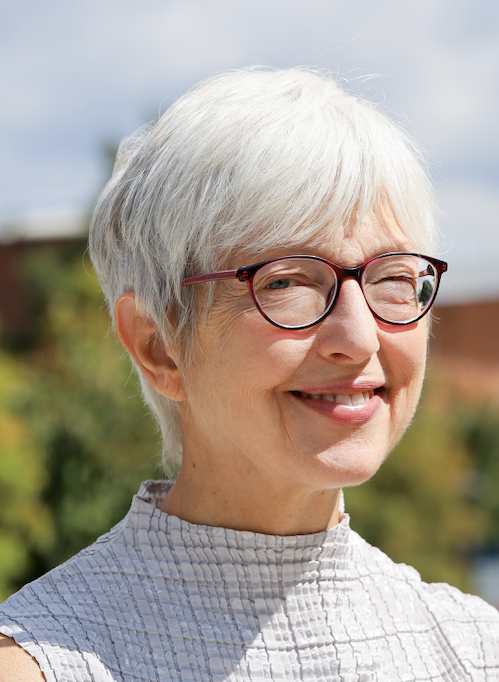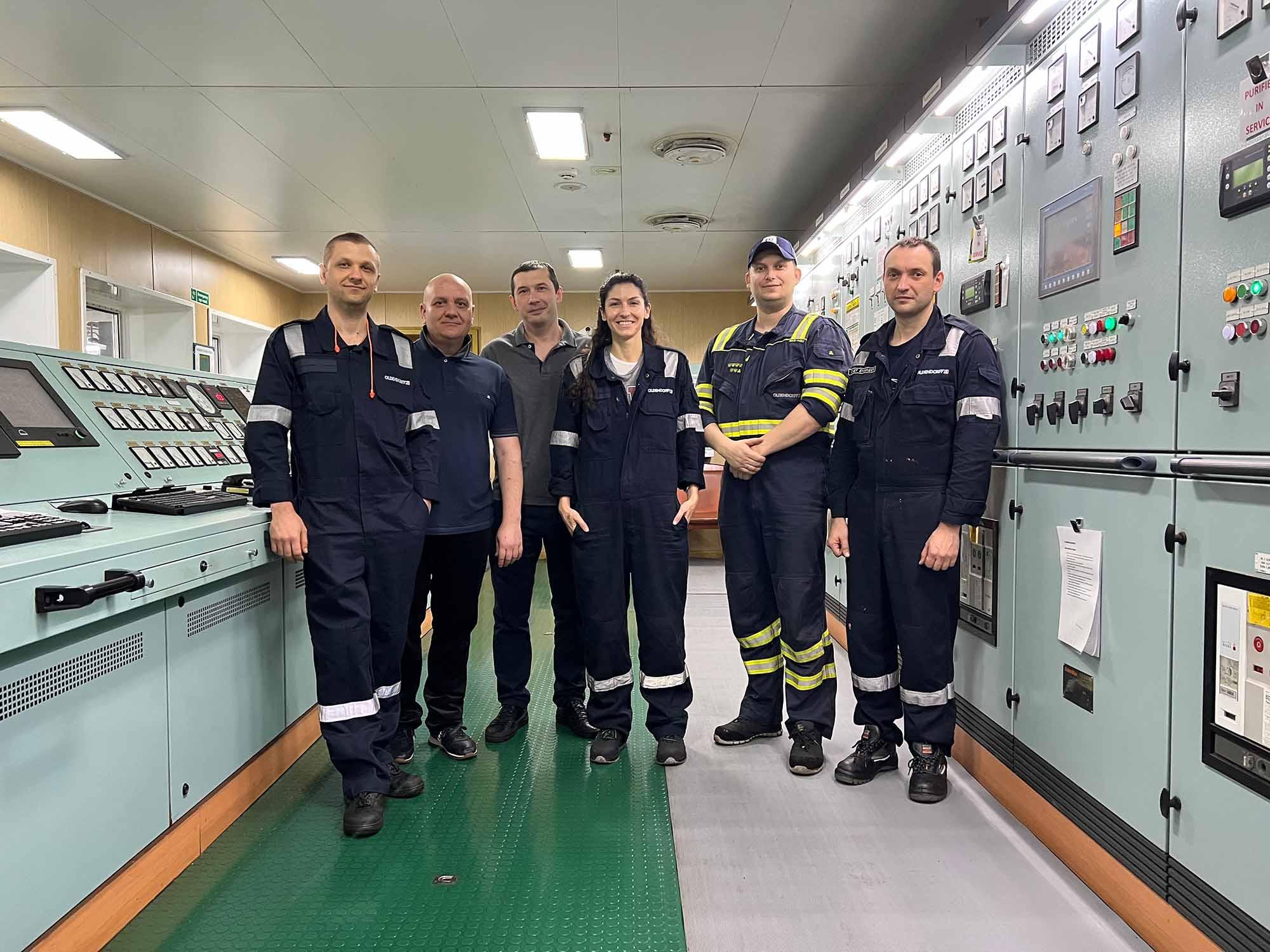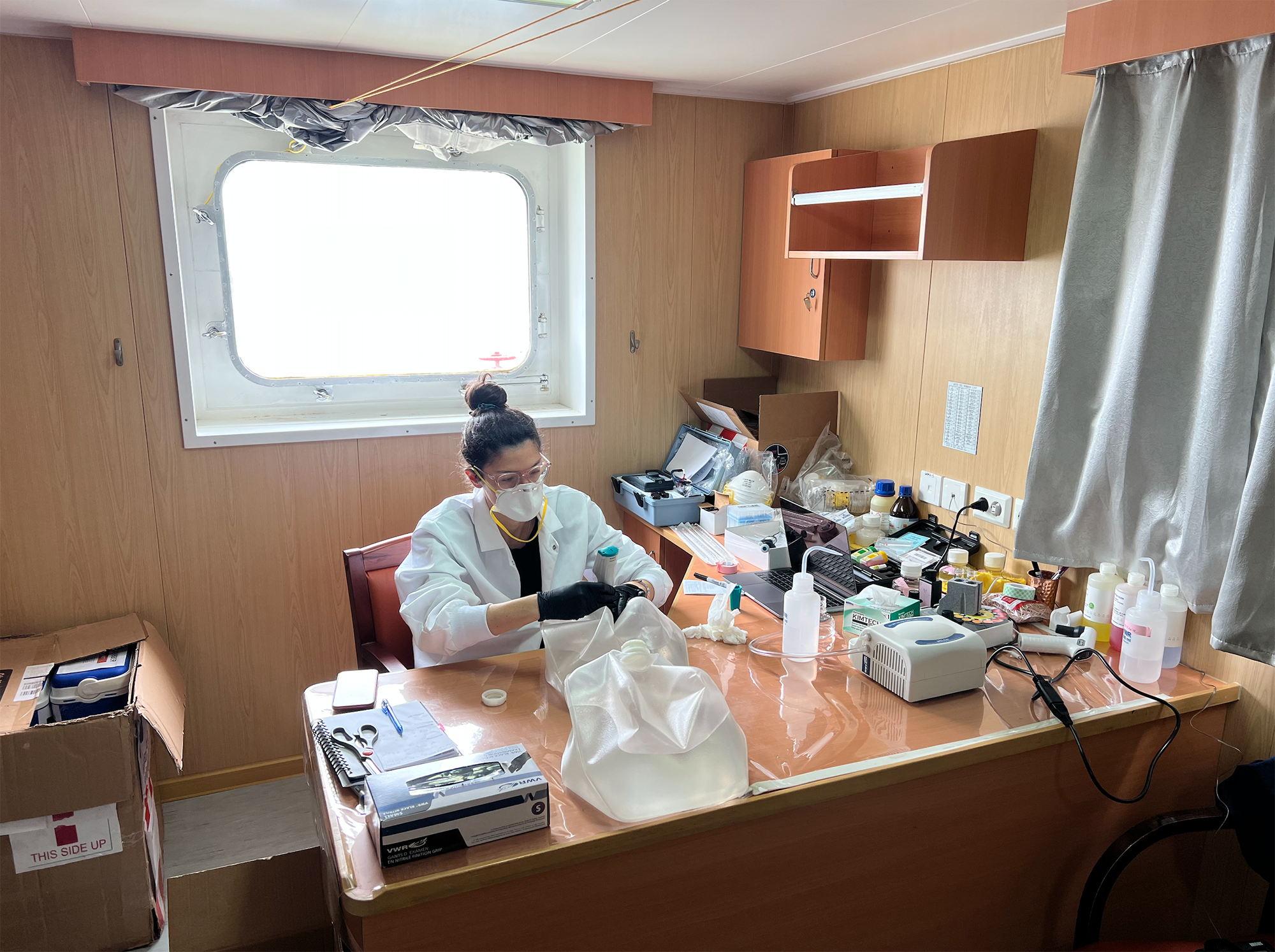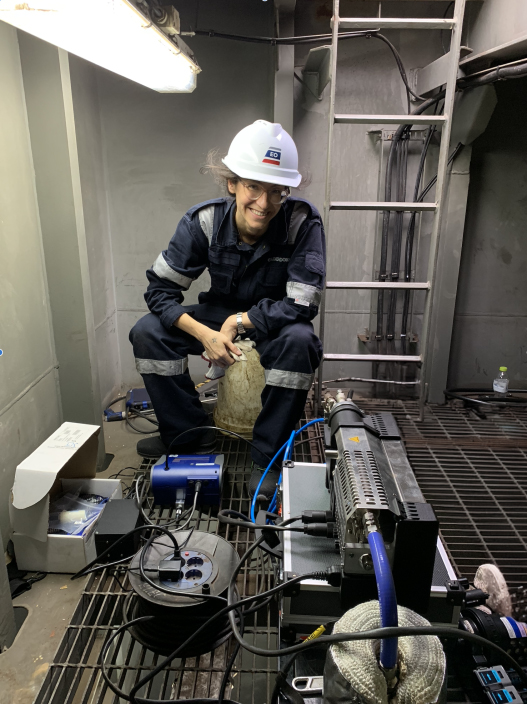Sustainability Workshop for Building and Lab Managers
Join fellow building managers to discuss best practices in creating sustainable events and buildings on campus. You’ll hear from fellow building managers and on-campus staff with expertise in waste management, hosting green events, green cleaning, dining, and green labs to help set your space up for sustainability success.
Community Spotlight - Ameet Pinto
Jul 03, 2024 —

-Written by Benjamin Wright-
Ameet Pinto, who is the Carlton S. Wilder Associate Professor in the School of Civil and Environmental Engineering, was drawn to Georgia Tech because of the depth and breadth of the research expertise on campus, as well as the collaborative atmosphere.
“I know that if I want to write a research proposal next week for a new idea and I lack expertise in one area, I can find a collaborator on campus with the necessary skillset,” they say. “We have a critical mass of highly skilled researchers across disciplines, and that’s truly amazing.” Helping others tap into that critical mass will be their primary role as one of two associate co-directors for interdisciplinary research in the Brook Byers Institute for Sustainable Systems. Ameet will work with associate professor Yuanzhi Tang from the School of Earth and Atmospheric Sciences to help bring like-minded researchers within the sustainability field together and shepherd them through the grant-writing process.
“My role, as I see it, is to help faculty from across the campus find synergies in their research and then amplify the impact of those synergies by assisting them in going after large thematic proposals with bid support,” says Ameet. “I’m super excited to help make those connections, and where those connections already exist, provide the support to help them take off.”
With degrees in chemical engineering, environmental engineering, and civil engineering and a personal research area that falls under environmental engineering, Ameet is used to working across interdisciplinary lines. Ameet uses their background in chemical engineering to develop sustainable methods to produce drinking water and treat wastewater.
“A major goal for my research group is to look at the microorganisms within the engineered water cycle. We can leverage them, beneficially, to make water treatment, wastewater treatment, and water delivery, both safe and sustainable,” he explains. “If we can use biological processes to remove contaminants, or to produce safe water, then we are not using chemicals.”
After stints teaching at Northeastern University and University of Glasgow, Ameet joined the Georgia Tech faculty in 2021 when the campus community was largely remote during Covid restrictions. Ameet is excited to use this new leadership role within BBISS to connect with others and help build a vibrant community of sustainability researchers.
“My personal vision is closely aligned with BBISS so I was excited to join the leadership team. I know there are other researchers like me looking to make connections with sustainability fields and I know I can help in that area. This is an amazing opportunity to get to know the campus community and connect with like-minded researchers while realizing a shared vision and mission.”
Outside of work Ameet loves to cook. They also have three cats, nine chickens, and their wife is an avid gardener who keeps them fully stocked in fresh produce. Originally from India, Ameet earned a bachelor’s degree in chemical engineering from the Institute of Chemical Technology (University of Mumbai), master’s from the University of Alaska Fairbanks, and Ph.D. from Virginia Tech.
Brent Verrill, Research Communications Program Manager, BBISS
Georgia Tech EVPR Chaouki Abdallah Named President of Lebanese American University
Jun 25, 2024 — Atlanta

Chaouki Abdallah, Georgia Tech's executive vice president for Research (EVPR), has been named the new president of the Lebanese American University in Beirut.
Abdallah, MSECE 1982, Ph.D. ECE 1988, has served as EVPR since 2018; in this role, he led extraordinary growth in Georgia Tech's research enterprise. Through the work of the Georgia Tech Research Institute, 10 interdisciplinary research institutes (IRIs), and a broad portfolio of faculty research, Georgia Tech now stands at No. 17 in the nation in research expenditures — and No. 1 among institutions without a medical school.
Additionally, Abdallah has also overseen Tech's economic development activities through the Enterprise Innovation Institute and such groundbreaking entrepreneurship programs as CREATE-X, VentureLab, and the Advanced Technology Development Center.
Under Abdallah's strategic, thoughtful leadership, Georgia Tech strengthened its research partnerships with historically Black colleges and universities, launched the New York Climate Exchange with a focus on accelerating climate change solutions, established an AI Hub to boost research and commercialization in artificial intelligence, advanced biomedical research (including three research awards from ARPA-H), and elevated the Institute's annual impact on Georgia's economy to a record $4.5 billion.
Prior to Georgia Tech, Abdallah served as the 22nd president of the University of New Mexico (UNM), where he also had been provost, executive vice president of academic affairs, and chair of the electrical and computer engineering department. At UNM, he oversaw long-range academic planning, student success initiatives, and improvements in retention and graduation rates.
A national search will be conducted for Abdallah's replacement. In the coming weeks, President Ángel Cabrera will name an interim EVPR.
Georgia Tech Named an AASHE Center for Sustainability Across the Curriculum
Jun 17, 2024 —

Georgia Institute of Technology has been named a Center for Sustainability Across the Curriculum by the Association for the Advancement of Sustainability in Higher Education (AASHE). Georgia Tech is one of only 21 Centers worldwide, reflecting a continued commitment to incorporating sustainability education through courses and co-curricular experiences.
This title is awarded to institutions with demonstrated experience in organizing sustainability education professional development opportunities for faculty and reflects the Institute’s efforts to increase the accessibility and diversity of education for sustainability, including community-engaged sustainability learning and teaching with the United Nations Sustainable Development Goals (SDGs). As a designated Center, Georgia Tech will host annual professional development events open to faculty from other institutions.
Read the full story on the Center for Teaching and Learning blog.
Center for Teaching and Learning
School of Public Policy Names First Three Byers Fellows
Jun 13, 2024 —

Georgia Tech’s School of Public Policy has named its first Byers Family Pathways to Policy Fellows and the offices where they will spend their internships in Washington.
Why it matters: These fellowships, funded by a transformative gift from Brook Byers and family, aim to develop future leaders in energy policy. The recipients will gain invaluable experience through year-long internships in Washington while expanding the School’s network and reach in the nation’s capital. The program also gives crucial support for students to live in Washington for a year.
“One of my key missions is to highlight the critical role of data in shaping effective policy,” said Jazmin Rivera, who will be working on decarbonization policy in U.S. Sen. Bill Cassidy’s office. “I believe that educated policymakers are essential for creating robust, evidence-based legislation. Through this fellowship, I aim to see legislation passed that is informed by my work, learn more about energy policy from the source, make bipartisan connections, and gain insights from productive activism."
Joining Rivera in Washington:
- Taylor Clarke: Focusing on environmental policy in the office of Sen. Jon Ossoff.
- Vincent Gu: Ph.D. student serving on the Senate Budget Committee, representing Sen. Sheldon Whitehouse of Rhode Island.
“Working with the Senate Budget Committee offers unique opportunities to interact with various government agencies and understand the collaborative efforts on climate issues,” Gu said. “Through this fellowship, I hope to gain a deeper understanding of the technical requirements for implementing climate solutions like hydrogen and electric vehicles and the work needed to make them feasible."
The big picture: Energy policy expertise is critical as the nation and world navigates the climate crisis, and programs like this show Georgia Tech’s School of Public Policy is delivering transformative learning experiences to prepare students for success.
“I am looking forward to what the next year holds and seeing what my peers will accomplish,” said Clarke. “Having adequate support for opportunities on the Hill is rare, so I am happy to see a program begin that can remove the cost barrier for passionate students.”
What they’re saying: “Georgia Tech students are problem solvers,” said Cassidy R. Sugimoto, Tom and Marie Patton Chair. “We're putting students in positions where they can work with national leaders in solving one of the most pressing problems of our time. We believe in education that makes a difference. This fellowship exemplifies our dedication to this value."
Michael Pearson
Ivan Allen College of Liberal Arts
Researchers Help Maritime Industry Navigate Toward Sustainability
Jun 11, 2024 —

Ocean shipping, the backbone of international trade, is significantly more energy efficient than air or land transport. However, cutting down on ocean freight carbon emissions will require a great deal of collaboration and effort. (Credit: Getty Images)
When people think of greenhouse gas emissions from transportation, what often comes to mind are airplanes and land vehicles like cars or trucks. But as efforts to slow climate change are ramping up, the spotlight is on another form of transport: ships.
The U.N.’s International Maritime Organization (IMO) has set targets to reduce shipping greenhouse gas emissions by at least 40% by 2030 and 70% by 2040, aiming for net-zero by 2050. Shipping currently accounts for about 3% of global annual greenhouse gas emissions, and the pressure is on shipping companies to meet these ambitious goals.
Across Georgia Tech, researchers are working toward a sustainable future for ocean shipping. This includes Valerie Thomas, the Anderson-Interface Chair of Natural Systems Professor in the H. Milton Stewart School of Industrial and Systems Engineering, and in the School of Public Policy. She is scholar of energy systems, sustainability, assessment, and low-carbon transportation fuels, and her work touches many aspects of the maritime industry.
Finding Sustainable Solutions
“Today, we ship a lot of goods by ocean freight, and there is certainly an environmental impact with shipping,” Thomas said. “But the emissions from shipping a product from East Asia to the U.S. on a bulk carrier vessel are significantly lower than trucking a product across the U.S. When ships are filled to the brim with cargo and are moving slowly across oceans, this is energy efficient, fuel efficient, and even cost efficient per ton of ‘stuff’ transported.”
While ocean shipping is significantly more energy efficient than air or land transport and contributes far fewer emissions, Thomas says cutting down on ocean freight emissions will require a great deal more effort. One way is to find more eco-friendly fuels.
“I look at big systems, and one of those areas is investigating alternative fuels,” Thomas said. “I’m often trying to figure out how much greenhouse gas various fuels emit, what other types of emissions or matter are coming out, and how to compare different fuel options.”
Thomas is a leading expert in life-cycle assessment. It is a method used to evaluate a fuel or technology's environmental impact throughout its entire cycle — from raw materials extraction, processing, manufacturing, distribution, and ultimately, use. Right now, basically all ships use petroleum fuels, which emit carbon dioxide and particulate matter into the air.
Finding fuel alternatives is not a simple task: Just because a fuel might initially seem like a promising low-carbon option, that is not always the case in the end. Thomas’s expertise in life-cycle assessments helps her figure out whether these possible fuels are truly environmentally friendly.
“One such example is hydrogen: It doesn’t emit carbon dioxide when burned,” Thomas said. “But the manufacturing of hydrogen can emit carbon dioxide, and therefore, hydrogen is not always a low-carbon fuel on a lifecycle basis.”
Helping the Shipping Industry Cut Carbon
Patricia Stathatou, a researcher at Georgia Tech’s Renewable Bioproducts Institute, specializes in sustainability assessment of chemical engineering processes and products, which includes lifecycle assessments and techno-economic assessments, evaluating both the environmental impacts and the economic viability of products and processes. Stathatou, who will join the School of Chemical and Biomolecular Engineering as an assistant professor in January 2025, also conducts experiments to support these assessments and guide the development of new technologies.
“My contribution to the lifecycle assessment field is that I support assessments with in-field emission monitoring, taking samples, and performing chemical analyses,” Stathatou said. “This helps identify specific pollutants that might be emitted into the air or be present in water, wastewater, or solid waste streams.”
But as maritime shipping companies rise to the challenge of cutting emissions, they often do not know where to start. This is where Stathatou’s experience comes in.
During her postdoctoral research at MIT, a major shipping company reached out to Stathatou and her colleagues asking for help in cutting emissions. They wanted to increase the energy efficiency of their fleet and investigate different strategies and technologies to eventually reach the IMO’s emissions goals.
Because of Stathatou’s expertise in alternative fuels, biofuels, and sustainable energy sources, she investigated potential solutions for the company, which included a six-day research trip monitoring emissions aboard one of the company’s bulk carrier vessels in East Asia. Her work involves designing experiments, measuring emissions, and evaluating the environmental impact of different fuels onboard bulk carrier vessels.
“Ten years ago, there weren't rigorous goals or guidelines for reducing emissions in the shipping industry — and not much scientific collaboration in the process,” Stathatou said. “If we are to make a difference in the industry in regard to climate, we need partnerships with shipping companies to help guide their efforts.”
Stathatou plans to continue her collaborations with shipping companies and expects to carry out more on-ship evaluations soon.
The Big Picture
According to Thomas, a holistic approach is needed to make shipping more sustainable. "It's not just about the fuels we use; it's about optimizing supply chains, reducing empty freight, and leveraging multimodal transportation options," Thomas said. "By embracing net-zero freight initiatives and maximizing efficiency in logistics, we can achieve meaningful reductions in emissions while meeting the demands of global trade."
Encouraging shifts to ocean freight is another means of reducing emissions. For example, if a company wants to transport goods from Miami to Baltimore, they don’t need to go by road or rail. “You can ship your freight on the ocean along the coast, and that could be more environmentally efficient,” Thomas said.
The work Thomas and Stathatou do is part of a broad portfolio of shipping sustainability research at Georgia Tech, which also includes the Georgia Tech Supply Chain and Logistics Institute, the Panama Logistics and Innovation Research Center, and the Net Zero Freight Systems Program, which Thomas co-leads. These partnerships aim to enhance the efficiency and sustainability of global supply chains, leveraging innovative research and practical applications.
“The work of evaluating different fuels, technologies, and strategies is not trivial, and figuring out these new methods does not happen quickly,” Thomas said. “These are difficult technologies, and it takes a long time to put them in place. That is why we need to do this work now.”
Stathatou envisions that, with more shipping companies now looking to curb their emissions, there will be significant adoption of new fuels and technologies within the next decade.
“Ocean shipping is a transportation sector that we cannot go without, and so decarbonizing it is very important,” Stathatou said. “I believe the ability to perform these assessments and guide the development of future solutions will have a tremendous impact on humanity.”

Valerie Thomas, the Anderson-Interface Chair of Natural Systems Professor in the H. Milton Stewart School of Industrial and Systems Engineering, and in the School of Public Policy. (Credit: Camille C. Henriquez)

Patricia Stathatou (third from right), a researcher at the Renewable Bioproducts Institute, with the carrier vessel's crew members. (Credit: Patricia Stathatou)

Stathatou preserving water and washwater samples from the vessel's scrubber so they can be stored and analyzed later in the lab. (Credit: Patricia Stathatou)

Stathatou prepares to measure particulate matter emissions in the vessel's funnel — a very windy area of the ship. (Credit: Patricia Stathatou)
Catherine Barzler, Senior Research Writer/Editor
Yongsheng Chen Awarded $300K Grant for Sustainable Agriculture AI Research
May 23, 2024 —

Yongsheng Chen, Bonnie W. and Charles W. Moorman IV Professor in Georgia Tech's School of Civil and Environmental Engineering, has been awarded a $300,000 National Science Foundation (NSF) grant to spearhead efforts to enhance sustainable agriculture practices using innovative AI solutions.
The collaborative project, named EAGER: AI4OPT-AG: Advancing Quad Collaboration via Digital Agriculture and Optimization, is a joint effort initiated by Georgia Tech in partnership with esteemed institutions in Japan, Australia, and India. The project aims to drive advancements in digital agriculture and optimization, ultimately supporting food security for future generations.
Chen, who also leads the Urban Sustainability and Resilience Thrust for the NSF Artificial Intelligence Research Institute for Advances in Optimization (AI4OPT), is excited about this new opportunity. "I am thrilled to lead this initiative, which marks a significant step forward in harnessing artificial intelligence (AI) to address pressing issues in sustainable agriculture," he said.
Highlighting the importance of AI in revolutionizing agriculture, Chen explained, "AI enables swift, accurate, and non-destructive assessments of plant productivity, optimizes nutritional content, and enhances fertilizer usage efficiency. These advancements are crucial for mitigating agriculture-related greenhouse gas emissions and solving climate change challenges."
To read the full agreement, click here.
Breon Martin
AI Research Communications Manager
Georgia Tech
City Cycling - Georgia Tech Community Class
Get comfortable traveling by bike with this instructional group ride! This in-person class is offered by Parking and Transportation Services in collaboration with Propel ATL and is designed specifically for members of the Georgia Tech community — that includes students, staff, and faculty!
City Cycling - Georgia Tech Community Class
Get comfortable traveling by bike with this instructional group ride! This in-person class is offered by Parking and Transportation Services in collaboration with Propel ATL and is designed specifically for members of the Georgia Tech community — that includes students, staff, and faculty!
City Cycling - Georgia Tech Community Class
Get comfortable traveling by bike with this instructional group ride! This in-person class is offered by Parking and Transportation Services in collaboration with Propel ATL and is designed specifically for members of the Georgia Tech community — that includes students, staff, and faculty!
